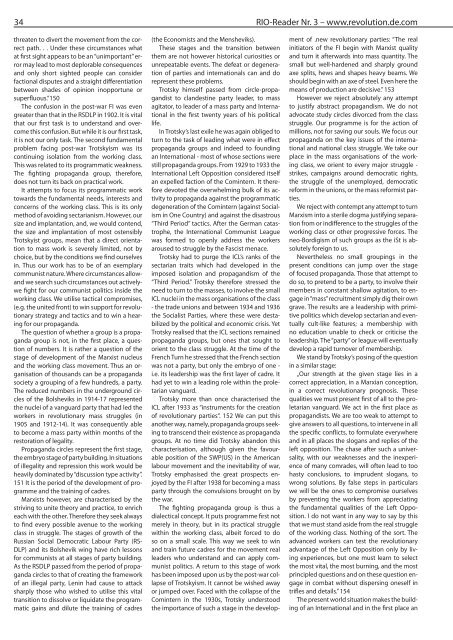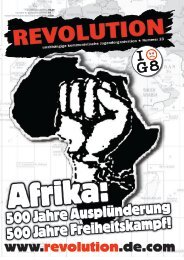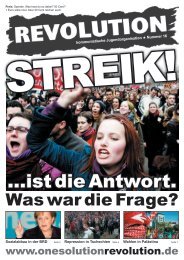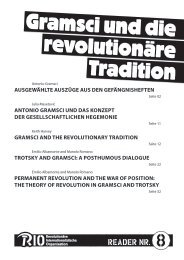Siebzig Jahre nach gründung der iV. internationale - Revolutionäre ...
Siebzig Jahre nach gründung der iV. internationale - Revolutionäre ...
Siebzig Jahre nach gründung der iV. internationale - Revolutionäre ...
Erfolgreiche ePaper selbst erstellen
Machen Sie aus Ihren PDF Publikationen ein blätterbares Flipbook mit unserer einzigartigen Google optimierten e-Paper Software.
34 RIO-Rea<strong>der</strong> Nr. 3 – www.revolution.de.com<br />
threaten to divert the movement from the correct<br />
path. . . Un<strong>der</strong> these circumstances what<br />
at first sight appears to be an “unimportant” error<br />
may lead to most deplorable consequences<br />
and only short sighted people can consi<strong>der</strong><br />
factional disputes and a straight differentiation<br />
between shades of opinion inopportune or<br />
superfluous.“150<br />
The confusion in the post-war FI was even<br />
greater than that in the RSDLP in 1902. It is vital<br />
that our first task is to un<strong>der</strong>stand and overcome<br />
this confusion. But while it is our first task,<br />
it is not our only task. The second fundamental<br />
problem facing post-war Trotskyism was its<br />
continuing isolation from the working class.<br />
This was related to its programmatic weakness.<br />
The fighting propaganda group, therefore,<br />
does not turn its back on practical work.<br />
It attempts to focus its programmatic work<br />
towards the fundamental needs, interests and<br />
concerns of the working class. This is its only<br />
method of avoiding sectarianism. However, our<br />
size and implantation, and, we would contend,<br />
the size and implantation of most ostensibly<br />
Trotskyist groups, mean that a direct orientation<br />
to mass work is severely limited, not by<br />
choice, but by the conditions we find ourselves<br />
in. Thus our work has to be of an exemplary<br />
communist nature. Where circumstances allowand<br />
we search such circumstances out activelywe<br />
fight for our communist politics inside the<br />
working class. We utilise tactical compromises,<br />
(e.g. the united front) to win support for revolutionary<br />
strategy and tactics and to win a hearing<br />
for our propaganda.<br />
The question of whether a group is a propaganda<br />
group is not, in the first place, a question<br />
of numbers. It is rather a question of the<br />
stage of development of the Marxist nucleus<br />
and the working class movement. Thus an organisation<br />
of thousands can be a propaganda<br />
society a grouping of a few hundreds, a party.<br />
The reduced numbers in the un<strong>der</strong>ground circles<br />
of the Bolsheviks in 1914-17 represented<br />
the nuclei of a vanguard party that had led the<br />
workers in revolutionary mass struggles (in<br />
1905 and 1912-14). It was consequently able<br />
to become a mass party within months of the<br />
restoration of legality.<br />
Propaganda circles represent the first stage,<br />
the embryo stage of party building. In situations<br />
of illegality and repression this work would be<br />
heavily dominated by “discussion type activity”.<br />
151 It is the period of the development of programme<br />
and the training of cadres.<br />
Marxists however, are characterised by the<br />
striving to unite theory and practice, to enrich<br />
each with the other. Therefore they seek always<br />
to find every possible avenue to the working<br />
class in struggle. The stages of growth of the<br />
Russian Social Democratic Labour Party (RS-<br />
DLP) and its Bolshevik wing have rich lessons<br />
for communists at all stages of party building.<br />
As the RSDLP passed from the period of propaganda<br />
circles to that of creating the framework<br />
of an illegal party, Lenin had cause to attack<br />
sharply those who wished to utilise this vital<br />
transition to dissolve or liquidate the programmatic<br />
gains and dilute the training of cadres<br />
(the Economists and the Mensheviks).<br />
These stages and the transition between<br />
them are not however historical curiosities or<br />
unrepeatable events. The defeat or degeneration<br />
of parties and internationals can and do<br />
represent these problems.<br />
Trotsky himself passed from circle-propagandist<br />
to clandestine party lea<strong>der</strong>, to mass<br />
agitator, to lea<strong>der</strong> of a mass party and International<br />
in the first twenty years of his political<br />
life.<br />
In Trotsky’s last exile he was again obliged to<br />
turn to the task of leading what were in effect<br />
propaganda groups and indeed to founding<br />
an International - most of whose sections were<br />
still propaganda groups. From 1929 to 1933 the<br />
International Left Opposition consi<strong>der</strong>ed itself<br />
an expelled faction of the Comintern. It therefore<br />
devoted the overwhelming bulk of its activity<br />
to propaganda against the programmatic<br />
degeneration of the Comintern (against Socialism<br />
in One Country) and against the disastrous<br />
“Third Period” tactics. After the German catastrophe,<br />
the International Communist League<br />
was formed to openly address the workers<br />
aroused to struggle by the Fascist menace.<br />
Trotsky had to purge the ICL’s ranks of the<br />
sectarian traits which had developed in the<br />
imposed isolation and propagandism of the<br />
“Third Period.” Trotsky therefore stressed the<br />
need to turn to the masses, to involve the small<br />
ICL nuclei in the mass organisations of the class<br />
- the trade unions and between 1934 and 1936<br />
the Socialist Parties, where these were destabilized<br />
by the political and economic crisis. Yet<br />
Trotsky realised that the ICL sections remained<br />
propaganda groups, but ones that sought to<br />
orient to the class struggle. At the time of the<br />
French Turn he stressed that the French section<br />
was not a party, but only the embryo of one -<br />
i.e. its lea<strong>der</strong>ship was the first layer of cadre. It<br />
had yet to win a leading role within the proletarian<br />
vanguard.<br />
Trotsky more than once characterised the<br />
ICL after 1933 as “instruments for the creation<br />
of revolutionary parties“. 152 We can put this<br />
another way, namely, propaganda groups seeking<br />
to transcend their existence as propaganda<br />
groups. At no time did Trotsky abandon this<br />
characterisation, although given the favourable<br />
position of the SWP(US) in the American<br />
labour movement and the inevitability of war,<br />
Trotsky emphasised the great prospects enjoyed<br />
by the FI after 1938 for becoming a mass<br />
party through the convulsions brought on by<br />
the war.<br />
The fighting propaganda group is thus a<br />
dialectical concept. It puts programme first not<br />
merely in theory, but in its practical struggle<br />
within the working class, albeit forced to do<br />
so on a small scale. This way we seek to win<br />
and train future cadres for the movement real<br />
lea<strong>der</strong>s who un<strong>der</strong>stand and can apply communist<br />
politics. A return to this stage of work<br />
has been imposed upon us by the post-war collapse<br />
of Trotskyism. It cannot be wished away<br />
or jumped over. Faced with the collapse of the<br />
Comintern in the 1930s, Trotsky un<strong>der</strong>stood<br />
the importance of such a stage in the develop-<br />
ment of .new revolutionary parties: “The real<br />
initiators of the FI begin with Marxist quality<br />
and turn it afterwards into mass quantity. The<br />
small but well-hardened and sharply ground<br />
axe splits, hews and shapes heavy beams. We<br />
should begin with an axe of steel. Even here the<br />
means of production are decisive.” 153<br />
However we reject absolutely any attempt<br />
to justify abstract propagandism. We do not<br />
advocate study circles divorced from the class<br />
struggle. Our programme is for the action of<br />
millions, not for saving our souls. We focus our<br />
propaganda on the key issues of the international<br />
and national class struggle. We take our<br />
place in the mass organisations of the working<br />
class, we orient to every major struggle -<br />
strikes, campaigns around democratic rights,<br />
the struggle of the unemployed, democratic<br />
reform in the unions, or the mass reformist parties.<br />
We reject with contempt any attempt to turn<br />
Marxism into a sterile dogma justifying separation<br />
from or indifference to the struggles of the<br />
working class or other progressive forces. The<br />
neo-Bordigism of such groups as the iSt is absolutely<br />
foreign to us.<br />
Nevertheless no small groupings in the<br />
present conditions can jump over the stage<br />
of focused propaganda. Those that attempt to<br />
do so, to pretend to be a party, to involve their<br />
members in constant shallow agitation, to engage<br />
in “mass” recruitment simply dig their own<br />
grave. The results are a lea<strong>der</strong>ship with primitive<br />
politics which develop sectarian and eventually<br />
cult-like features; a membership with<br />
no education unable to check or criticise the<br />
lea<strong>der</strong>ship. The “party” or league will eventually<br />
develop a rapid turnover of membership.<br />
We stand by Trotsky’s posing of the question<br />
in a similar stage:<br />
„Our strength at the given stage lies in a<br />
correct appreciation, in a Marxian conception,<br />
in a correct revolutionary prognosis. These<br />
qualities we must present first of all to the proletarian<br />
vanguard. We act in the first place as<br />
propagandists. We are too weak to attempt to<br />
give answers to all questions, to intervene in all<br />
the specific conflicts, to formulate everywhere<br />
and in all places the slogans and replies of the<br />
left opposition. The chase after such a universality,<br />
with our weaknesses and the inexperience<br />
of many comrades, will often lead to too<br />
hasty conclusions, to imprudent slogans, to<br />
wrong solutions. By false steps in particulars<br />
we will be the ones to compromise ourselves<br />
by preventing the workers from appreciating<br />
the fundamental qualities of the Left Opposition.<br />
I do not want in any way to say by this<br />
that we must stand aside from the real struggle<br />
of the working class. Nothing of the sort. The<br />
advanced workers can test the revolutionary<br />
advantage of the Left Opposition only by living<br />
experiences, but one must learn to select<br />
the most vital, the most burning, and the most<br />
principled questions and on these question engage<br />
in combat without dispersing oneself in<br />
trifles and details.” 154<br />
The present world situation makes the building<br />
of an International and in the first place an





